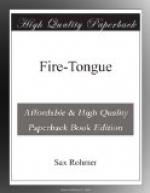“There he is!” cried Harley—“heading for the Dover Road!”
Nicol Brinn, at the wheel of the racer—the same in which Harley had made his fateful journey and which had afterward been concealed in the garage at Hillside—scarcely nodded.
Nearer they drew to the quarry, and nearer. Once—twice—and again, the face of Ormuz Khan peered out of the window at the rear of the limousine.
They drew abreast; the road was deserted. And they passed slightly ahead.
Paul Harley glanced at the granite face of his companion with an apprehension he was unable to conceal. This was a cool madman who drove. What did he intend to do?
Inch by inch, Nicol Brinn edged the torpedo body nearer to the wheels of the racing limousine. The Oriental chauffeur drew in ever closer to the ditch bordering the roadside. He shouted hoarsely and was about to apply the brakes when the two cars touched!
A rending crash came—a hoarse scream—and the big limousine toppled over into the ditch.
Harley felt himself hurled through space.
“Shall I follow on to Lower Claybury, sir?” asked Inspector Wessex, excitedly.
Phil Abingdon’s message had come through nearly an hour before, and a party had been despatched in accordance with Brinn’s instructions. Wessex had returned to New Scotland Yard too late to take charge, and now, before the Assistant Commissioner had time to reply, a ’phone buzzed.
“Yes?” said the Assistant Commissioner, taking up one of the several instruments: “What!”
Even this great man, so justly celebrated for his placid demeanour, was unable to conceal his amazement.
“Yes,” he added. “Let him come up!” He replaced the receiver and turning to Wessex: “Mr. Nicol Brinn is here!” he informed him.
“What’s that!” cried the inspector, quite startled out of his usual deferential manner.
Footsteps sounded in the corridor. Came a rap at the door.
“Come in,” said the Assistant Commissioner.
The door was thrown open and Nicol Brinn entered. One who knew him well would have said that he had aged ten years. Even to the eye of Wessex he looked an older man. He wore a shoddy suit and a rough tweed cap and his left arm was bandaged.
“Gentlemen,” he said, without other greeting, “I’m here to make a statement. I desire that a shorthand-writer attend to take it down.”
He dropped weakly into a chair which Wessex placed for him. The Assistant Commissioner, doubtless stimulated by the manner of his extraordinary visitor, who now extracted a cigar from the breast pocket of his ill-fitting jacket and nonchalantly lighted it, successfully resumed his well-known tired manner, and, pressing a bell:
“One shall attend, Mr. Brinn,” he said.
A knock came at the door and a sergeant entered.
“Send Ferris,” directed the Assistant Commissioner. “Quickly.”




